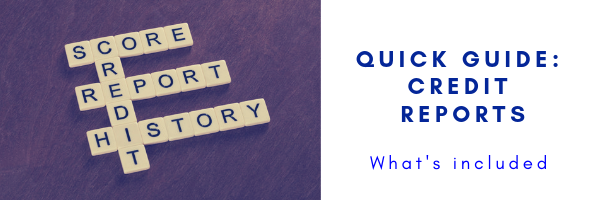
What is a Credit Report?
A credit report is basically a record of your credit history. It includes information about your credit accounts, and shows how you manage your finances (for example how much you owe and if you pay back on time). It also contains details that help confirm your identity, such as your current and previous addresses and if you are present on the electoral roll.
When you apply for credit, lenders will check your credit report to help them asses how much of a risk it would be to lend to you.
Who Looks at My Credit Report?
When you make a credit application you will normally be asked for your permission for the credit provider to check your credit report.
A credit provider does not just mean banks, lenders, mortgage providers and credit card companies, it also includes mobile phone contract providers, utility providers and insurance companies.
Be reassured that companies are only able to see the data on your credit report if they have a legitimate reason, for example if you applied for a credit card with them.
Your credit report can also be be checked by landlords, letting agencies and employers (with your permission), but they normally only see public record information:
- electoral roll details
- County Court Judgments (Decrees in Scotland)
- Insolvency records
What is in My Credit Report?
- Your full name
- Your date of birth
- Your current and previous addresses
- Your electoral roll information
- Any overdrafts you have
- Your current credit accounts, including bank, credit card and mortgage accounts. It will also include any other outstanding credit arrangements you have such as utility company debts. The credit limit (or loan amount) and the outstanding balance on each account will also be included
- Details about your repayments - have they been made on time and in full or how many times they have been missed. Any defaults will stay on your credit report for a minimum of six years
- Public record information, such as County Court Judgments (Decrees in Scotland), Individual Voluntary Arrangements (IVAs) or bankruptcies in the last six years
- Financial connections - people who are linked to you because you have taken out credit together
- A record of any hard searches a lender has carried out on you (as a result of a credit application) and the dates of the checks. Soft seaches are also recorded on your credit report but only you can see this
- If you have been a victim of fraud (or you have committed fraud) this information will show as Cifas notification
What Isn't On My Credit Report?
- What is in your current account
- Your savings
- Your salary
- Student loans
- Criminal record
- Medical history
- Council tax arrears
- Motoring fines
What is a Credit Score?
A credit score is a number that is calculated from your credit report to represent your credit history. If you have a higher score, you will generally be viewed as being a lower risk and are more likely to obtain credit at more favourable terms.
It is important to note that your Credit Score is only a guide as it is not the same as an individual lender's score. Even if you have a high Credit Score it does not guarantee that you will be accepted for credit as each lender has different criteria when assessing which customers to lend money to.
Do Lenders See My Credit Score?
No - your credit score is only available to you and should be used as a guide to help you gain knowledge about your credit profile.
When you make a credit application, the lender will assess this based on your most recent credit report activity. The lender will not see historical information which has since changed.
When making a lending decision, lenders will take into account various factors including:
- The details provided in your enquiry
- Date from the Credit Reference Agency: credit payment history, if you are on the electoral roll at your present address, if you have any CCJ’s or Insolvencies
- Details surrounding existing accounts you have with the lender
- The lender's internal rules and policies
Does Checking My Credit Report Lower My Credit Score?
No! Checking your credit report will never impact your credit score.
Why You Should Check Your Credit Report >>
Quick Guide: Credit Reports- Key Points:
- A credit report is record of your credit history
- Credit providers use your credit report to help them make a decision on whether or not to lend to you
- Only companies with a legitimate reason can view your report
- Your credit report contains information to help verify your identity - your name, address, date of bith and presence on the electoral roll
- It also contains public record information
- Your credit report contains information about your finances - how much credit you have available, how much you owe and if you pay back on time.
- It also shows the hard searches that credit providers have carried out
- It does not contain information such as you savings, salary, council tax arrears or student loans
- Your credit score is a number to used to represent your credit history
- The higher the score the better
- Lenders do not see your credit score
- Checking you credit report does not impact your credit score
Editorial Disclaimer: This article was updated 30th March 2019
Opinions expressed here are the author's alone, and not those of any bank, credit card issuer or any other company. This article has not been reviewed, approved or otherwise endorsed by any of these organisations.